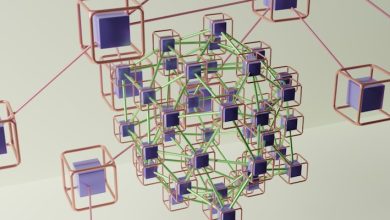Cosmos (ATOM): The Internet of Blockchains

- Understanding the Cosmos ecosystem
- The revolutionary concept of the Internet of Blockchains
- Exploring the interoperability of Cosmos (ATOM)
- Key features and benefits of Cosmos for blockchain developers
- How Cosmos is reshaping the future of decentralized applications
- The potential impact of Cosmos on the blockchain industry
Understanding the Cosmos ecosystem
The Cosmos ecosystem is a network of interconnected blockchains that aim to create an Internet of Blockchains. By allowing different blockchains to communicate and exchange data with each other, Cosmos enables seamless interoperability and scalability in the world of decentralized applications (dApps). This interconnectedness opens up a world of possibilities for developers and users alike, as they can leverage the strengths of different blockchains while maintaining security and decentralization.
One of the key components of the Cosmos ecosystem is the Cosmos Hub, which serves as the main hub for connecting different blockchains within the network. The Hub uses the Cosmos SDK to enable developers to build custom blockchains that are compatible with the Cosmos ecosystem. This modular framework allows for easy customization and flexibility, making it easier for developers to create tailored solutions for their specific needs.
In addition to the Cosmos Hub, the ecosystem also includes various other components such as Tendermint, the Inter-Blockchain Communication (IBC) protocol, and the Cosmos staking mechanism. Tendermint is a Byzantine Fault Tolerant (BFT) consensus engine that ensures the security and reliability of the network. The IBC protocol enables cross-chain communication, allowing different blockchains to securely exchange data and assets. The Cosmos staking mechanism incentivizes users to stake their tokens in order to help secure the network and earn rewards in return.
Overall, the Cosmos ecosystem is a thriving and dynamic environment that is constantly evolving and expanding. With its focus on interoperability, scalability, and security, Cosmos is well-positioned to become a key player in the world of decentralized finance and blockchain technology. Whether you are a developer looking to build on a secure and scalable platform, or a user looking to access a wide range of dApps and services, Cosmos offers a world of opportunities for innovation and growth.
The revolutionary concept of the Internet of Blockchains
The revolutionary concept of the Internet of Blockchains is at the core of Cosmos (ATOM). This innovative approach aims to solve the scalability, interoperability, and usability issues that have plagued the blockchain industry for years. By creating an interconnected network of independent blockchains, Cosmos allows for seamless communication and transfer of assets between different chains.
Unlike traditional blockchains that operate in isolation, Cosmos enables various blockchains to interact with each other through a hub called the Cosmos Hub. This hub acts as a mediator, facilitating the exchange of data and assets across different chains. This interconnected ecosystem opens up a world of possibilities for developers and users, allowing them to build and use decentralized applications that can leverage the strengths of multiple blockchains.
With the Internet of Blockchains, Cosmos is paving the way for a more efficient and scalable blockchain ecosystem. By breaking down the barriers between different chains, Cosmos is creating a truly decentralized and interconnected network that has the potential to revolutionize the way we think about blockchain technology.
Exploring the interoperability of Cosmos (ATOM)
One of the key features of Cosmos (ATOM) is its interoperability, which allows different blockchains to communicate and transact with each other seamlessly. This interoperability is achieved through the use of the Inter-Blockchain Communication (IBC) protocol, which enables various blockchains to exchange data and value in a secure and trustless manner.
By exploring the interoperability of Cosmos (ATOM), developers can create decentralized applications (dApps) that can leverage the capabilities of multiple blockchains. This means that users can access a wide range of services and functionalities without being limited to a single blockchain network. This interoperability opens up a world of possibilities for innovation and collaboration in the blockchain space.
Furthermore, Cosmos (ATOM) is built on a modular architecture that allows for easy integration with other blockchains and protocols. This modularity makes it simple for developers to customize and extend the functionality of Cosmos-based applications, creating a more flexible and adaptable ecosystem.
Overall, the interoperability of Cosmos (ATOM) is a game-changer for the blockchain industry, as it enables seamless communication and collaboration between different blockchain networks. This paves the way for a truly interconnected and decentralized internet of blockchains, where users can access a wide range of services and applications without limitations.
Key features and benefits of Cosmos for blockchain developers
One of the key features of Cosmos for blockchain developers is its interoperability. Cosmos allows different blockchains to communicate with each other, enabling seamless transfer of assets and data across various chains. This interoperability feature opens up a world of possibilities for developers looking to build decentralized applications that require interaction between multiple blockchains.
Another benefit of using Cosmos is its scalability. With Cosmos, developers can create their own custom blockchains, known as “zones,” which can easily scale to meet the demands of their applications. This scalability feature is crucial for developers working on projects that require high transaction throughput and fast confirmation times.
Cosmos also offers a high level of security for developers. By utilizing a consensus algorithm called Tendermint, Cosmos ensures that transactions on the network are secure and tamper-proof. This security feature is essential for developers building applications that handle sensitive data or valuable assets.
In addition to interoperability, scalability, and security, Cosmos provides developers with a user-friendly environment for building and deploying blockchain applications. The Cosmos SDK (Software Development Kit) makes it easy for developers to create custom blockchains and decentralized applications without having to start from scratch. This streamlined development process saves time and resources, allowing developers to focus on building innovative solutions.
Overall, Cosmos offers blockchain developers a powerful platform with key features such as interoperability, scalability, security, and user-friendly development tools. By leveraging these features, developers can create cutting-edge decentralized applications that push the boundaries of what is possible in the world of blockchain technology.
How Cosmos is reshaping the future of decentralized applications
Cosmos is revolutionizing the world of decentralized applications by providing a platform for interoperability between different blockchains. This interoperability allows for seamless communication and data transfer between blockchains, opening up a myriad of possibilities for developers and users alike.
By utilizing the Cosmos SDK, developers can easily build custom blockchains that are compatible with the Cosmos network. This flexibility enables the creation of specialized blockchains tailored to specific use cases, whether it be for finance, gaming, or social networking.
One of the key features of Cosmos is its ability to scale horizontally, meaning that as more blockchains join the network, the overall capacity and performance of the system increase. This scalability is crucial for supporting a growing number of decentralized applications and users without compromising speed or efficiency.
Furthermore, Cosmos introduces a novel consensus algorithm called Tendermint, which ensures fast and secure transaction processing across the network. This consensus mechanism is essential for maintaining the integrity and reliability of the entire Cosmos ecosystem.
Overall, Cosmos is reshaping the future of decentralized applications by providing a robust and scalable infrastructure for developers to build upon. With its focus on interoperability, flexibility, scalability, and security, Cosmos is poised to become a cornerstone of the emerging Internet of Blockchains.
The potential impact of Cosmos on the blockchain industry
The potential impact of Cosmos on the blockchain industry is significant, as it aims to address the current challenges of scalability, interoperability, and usability faced by existing blockchain networks. By providing a framework for different blockchains to communicate and transact with each other seamlessly, Cosmos has the potential to revolutionize the way decentralized applications are built and operated.
One of the key features of Cosmos is its ability to facilitate cross-chain communication through the use of Inter-Blockchain Communication (IBC) protocol. This allows different blockchains within the Cosmos ecosystem to exchange value and data in a secure and trustless manner, opening up a world of possibilities for developers and users alike.
Furthermore, Cosmos’ modular architecture and customizable consensus mechanisms make it a versatile platform that can adapt to different use cases and requirements. This flexibility not only makes it easier for developers to create and deploy new blockchain applications but also enhances the overall user experience by enabling faster transaction speeds and lower fees.
Overall, Cosmos has the potential to play a crucial role in shaping the future of the blockchain industry by fostering innovation, collaboration, and scalability. With its focus on interoperability and usability, Cosmos is well-positioned to drive mainstream adoption of blockchain technology and unlock new opportunities for businesses and individuals around the world.



